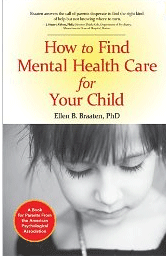How to Find Mental Health Care for Your Child

“How to Find Mental Health Care for Your Child”
By Ellen B. Braaten, Ph.D.
American Psychological Association
Washington, D.C., 2011
Accessible guide helpful to parents
Reviewed by James K. Luiselli, Ed.D., ABPP, BCBA-D
Ellen B. Braaten, Ph.D. is affiliated with Harvard Medical School, a child psychologist who specializes in pediatric neuropsychology and psychological testing. Braaten has written several noteworthy books for parents and professionals, most recently “How to Find Mental Health Care for Your Child.” The book is well conceived, highly informative, and an invaluable resource for families.
The author writes, “I have found that seeking mental health care is one of the most anxiety provoking decisions that many parents face.” Accordingly, part I of the book features chapters that guide parents in determining whether their child may have a mental health problem and if so, how to arrange and what to expect from a psychological evaluation. She also presents an overview chapter about different treatment modalities, advising that the most critical issue for parents is that they feel confident in the competence of the psychologist they are consulting.
Part II of the book covers common childhood disorders: attention and disruptive behavior disorders, autism and pervasive developmental disorders, mood disorders, anxiety disorders, learning disabilities and eating disorders. Each chapter gives a concise but complete description of the respective diagnostic criteria as well as details about clinical specificity. For example, in the chapter concerned with anxiety disorders, Braaten addresses the particulars of seasonal affective disorder, generalized anxiety disorder, specific phobia, social phobia, obsessive compulsive disorder and posttraumatic stress disorder.
The chapters contained in the third part of the book deal with particular treatment options such as interpersonal and insight-oriented approaches, family therapy, cognitive behavior therapy and school-based supports. These chapters effectively outline the typical course of each treatment and the types of disorders that appear to respond most successfully. Brief case vignettes illustrate key elements of the therapeutic process.
Parents reading this book will find an accessible and easily understood guide. Braaten writes clearly, avoids technical jargon and formulates her recommendations on the best available evidence-based practices. As to be expected, the book won’t answer every question but it certainly comes close! Parents who have some idea about the problems their child is experiencing may find the book useful by only referring to certain chapters. Alternatively, reading the entire book would be instructive for parents who want accurate information about diagnosing, evaluating and treating the most typically encountered childhood disorders.
Other resources in the book are lists of books that parents and children can read to learn more about a specific disorder. Also included are reputable Web sites for locating internet information sources. An additional benefit is that the book is reasonably priced, which should contribute to its market appeal. I expect that “How to Find Mental Health Care for Your Child” will help many parents and congratulate Braaten for the sensitive and pragmatic guidance she offers.
James K. Luiselli, Ed.D., ABPP, BCBA-D, is senior vice president, applied research, clinical training and peer review at the May Institute in Norwood, Mass.
Learn more about the book: How to Find Mental Health Care for Your Child (APA Life Tools)
